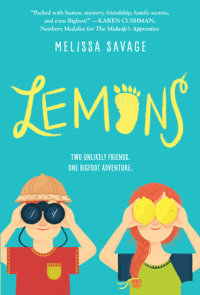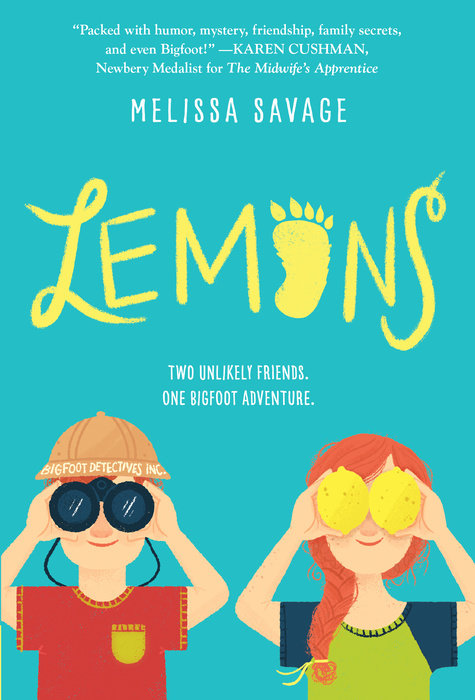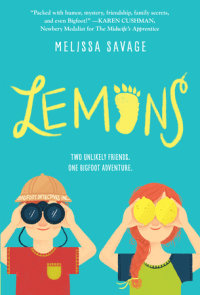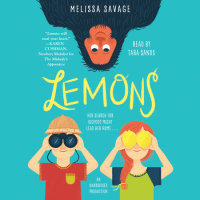Lemons
The search for Bigfoot gets juicy in this funny and touching story that’s perfect for fans of Kate DiCamillo’s Flora & Ulysses and the movie Smallfoot!
Lemonade Liberty Witt’s mama always told her: When life gives you lemons, make lemonade. But Lem can’t possibly make lemonade out of her new life in Willow Creek, California—the Bigfoot Capital of the World—where she’s forced to live with a grandfather she’s never met after her mother passes away.
Then she meets eleven-year-old Tobin Sky, the CEO of Bigfoot Detectives Inc., who is the sole Bigfoot investigator for their small town. After he invites Lem to be his assistant for the summer, they set out on an epic adventure to capture a shot of the elusive beast on film. But along the way, Lem and Tobin end up discovering more than they ever could have imagined. And Lem realizes that maybe she can make lemonade out of her new life after all.
"Melissa Savage's astoundingly good debut novel is packed with humor, mystery, friendship, family secrets, and even Bigfoot! I think you'll love it, too." —Karen Cushman, Newbery Medalist for The Midwife's Apprentice
An Excerpt fromLemons
1
One Woolly Monster and a Weirdo Kid
Bigfoot.
It’s the very first thing I see when we pull into town. A gargantuan wooden statue of the hairy beast, stuck right smack in the middle of the square, like he’s the mayor or President Ford or someone real important like that.
“Where are we, anyway?” I ask the social worker who came to get me all the way down in San Francisco.
I’ve only met her once before this and I can’t remember her name. I think it starts with a W. Maybe an M. There were two of them who came to visit. I can’t remember the other lady’s name either. This one must have drawn the short straw to have to drive me all the way up to this Podunk place.
“We finally made it, Lemonade.” Her eyes meet mine in the rearview mirror. “They say Willow Creek is the Bigfoot capital of the world.”
“You mean like that thing actually lives here?”
She smiles and makes a left turn down Seventh Street. “We’re almost there, should be just up this way a piece.”
This place is nothing like home. And I already know I’m going to hate it.
Tall pines instead of skyscrapers, dirt instead of sidewalks, and one woolly monster lurking somewhere in the forest. With my luck, his main food source is ten-year-old girls.
“I want to go home,” I mutter under my breath. “Why couldn’t I have just stayed with my teacher?” I call up to the front seat. “Miss Cotton said she loves having me there. She even told me so.”
“I’m sorry, Lemonade,” she says, keeping her eyes on the road this time. “I’m afraid that’s not an option right now. There would have to be forms completed for that to happen permanently.”
“She would do that,” I tell the lady. “She always has our papers corrected by the very next day. Just ask her, she’ll tell you.”
“I’ve already spoken to her about it, honey,” she says. “Believe me, if things change, you’ll be the first to know.”
“I’ll make sure and remind her. She promised to call me sometimes and write me letters, too. At least until I get to go back.”
This time the lady doesn’t say anything.
I lay my head back on the seat and stick my arm out the window. The warm summer air grabs it, and my hand hangs ten on a wind wave. I breathe in deep.
It smells like grass.
Dirt.
And bugs.
At home, the air smells like ocean mixed with car exhaust and the glorious crispy fried egg rolls from Mr. Chin’s restaurant on the corner. He makes the best egg rolls in town. The sign in the window even says so.
The sky is a fire orange, even though the sun is just about out of sight behind the trees, leaving long, dark shadows between the pines that line the road.
Which is the reason why I almost miss him.
Some weirdo kid darts through the trees with binoculars hanging from his neck.
He’s wearing a floppy tan safari hat folded up in front and held on by a strap under his chin. Across the underside of the brim are some kind of hand-painted letters. I can tell they say something real important, too, because why else would you have hand-painted letters anywhere?
But he’s running so fast I can’t read what they say.
2
The Second-Worst Day of My Life
“Lemonade,” the old man says slowly, like he’s trying it on for size.
He eyes me from under unruly gray eyebrows in the front hall of one of the old farmhouses lined up on Seventh Street.
The lady turned up the driveway of the medium-sized white one with yellow shutters on it. We walked up five wooden steps and onto a great big porch wrapped all around it, with a bright yellow swing just to the left of the front door.
Inside, it’s nothing like our apartment in the city--it’s cold and dark and smells like old books and coffee beans. At home we live on the third floor of a Victorian walk-up. Mama painted every wall pink and hung white fluffy curtains at all the windows and there were always fresh daisies on the kitchen counter except in the winter. She had the record player going all the time too. Usually Simon and Garfunkel or Cat Stevens and sometimes James Taylor.
This place doesn’t have anything playing, not a television set or a radio or anything. And the walls are just plain white ones with only boring wooden blinds at the windows.
“We meant to get here by four, but the traffic in the city was awful,” the social worker tells the man.
It’s weird that I can’t remember her name, since we only drove for six whole hours to get to this place. We even played a round of the alphabet game until my eyelids got so heavy I couldn’t keep them open anymore. I was winning up until then, after spotting a Q on a liquor store sign outside Redding.
“Not a problem,” the man tells her, continuing to eye me.
I eye him right back.
He’s missing the middle part of his hair, like someone divided his head up into thirds and subtracted the center.
I’m real good at math. I got an A in Mr. Mahoney’s math class, and everyone knows Mr. Mahoney gives the hardest tests at Sherman Elementary.
“Lemonade,” the man says again, running a hand through one of the thirds of hair that’s still there. It’s black and wavy with speckles of gray mixed in. There’s a short beard right around his mouth that has even more gray in it than the ring around his head. He has on a checkered short-sleeved shirt and long tan shorts with hiking boots and tall white socks that come up to his knees.
“Lemonade Liberty Witt,” I say, standing straight. “Lem for short. I’m ten and three quarters. I’ll be eleven on September sixth.”
“Uh-huh.” He pulls horn-rimmed glasses from the checkered shirt pocket and slips them across his nose to examine me some more. There’s a bright silver ring on his finger. “Small for ten and three quarters, aren’t you?”
He’s full of the kinds of questions that don’t seem to want answers.
So he doesn’t get one.
I cross my arms and glare at him instead.
“Same green eyes . . . and”--he clears his throat--“those red curls.”
I swallow hard.
“Can you tell us where Lemonade will be staying while she’s here, Mr. Witt?” the lady asks with a straight-lipped smile stretched across her teeth.
He sighs and stuffs his glasses back in his front pocket. “This way, second door on your right,” he grumbles, making his way down a dark hall just past the kitchen. “Grab your suitcase,” he calls over his shoulder.
My fingers curl around the handle of Mama’s pink suitcase, but the lady waves my hand away and grabs it for me. I follow it, my eyes fixed on the bouncing red tag that’s tied to the handle with a bright orange and green crocheted yarn braid. It has Mama’s handwriting on it.
Elizabeth Lilly Witt
245 Ashbury Street, Apt. 3095
San Francisco, California
The wooden floorboards in the hall groan under each step, and there’s a loud ticking from a clock somewhere in the house. The plain white walls in the hall are filled with crooked-hanging picture frames telling the story of a happy family.
The house is quiet.
Too quiet.
There are no sounds of traffic or honking horns or bustling feet of people on their way to their office. There’s not even any opera singing from Miss Kay in 3096, practicing for her evening performance at the San Francisco Opera.
Just a moaning floor, a ticking clock, and the sound of my own pulse pounding against my temple.
I stop just outside the second door on the right and peek inside. This can’t be it. Maybe he meant the third door on the left.
I watch the social worker plop Mama’s suitcase on top of a blue and green wool blanket that’s pulled tight across a single mattress. There’s a ratty trunk at the end of the bed and a wooden chest of drawers with bronze handles in a far corner. An old radiator sits under the window with cobwebs near the floorboards, and a hundred dull-looking grown-up books line a wall of bookshelves.
“It’s my study,” the old man says like it’s an apology. “It’s the best I could do on such short notice. . . .” His voice trails off into a whisper, and he clears his throat again. “I had no idea . . .”
“It’s just fine,” the lady says. “Lemonade, why don’t you put some of your things in the drawers while I talk with your grandfather.”
Grandfather.
He must be a mind reader too, because he clears his throat a bunch more times and says, “You can call me Charlie,” before making his way out the door.
She follows him, her lips in the same straight-line smile, but before she closes the door, she meets my eyes one more time.
“I’ll be back to check on you each month,” she says.
I don’t say anything.
“It’s going to be okay,” she tells me. “It really is.”
Except I don’t know who she’s trying to convince.
“No, it’s not,” I tell her. “It’s never going to be okay ever again.”
She smiles that kind of smile like she thinks she understands me even though I know she doesn’t.
No one does.
Except maybe Miss Cotton and all my friends at home. They understand because they were there on the single worst day of my entire life. I bite the inside of my cheek to keep the tears from dropping and watch her slowly pull the door closed behind her. I sit down next to Mama’s suitcase. The blue and green wool blanket itches me on the backs of my legs.
Delores. Delores Jaworski. That’s her name.
I sure hope the next time I see her she has those papers she was talking about because there’s no way I can stay here.
There’s no fluffy down comforter with a big, beautiful rainbow on it like the one I have at home. And no plastic stars on the ceiling that glow when the lights are off. And there’s not even a warm, fuzzy rug in the middle of the floor for cold mornings.
This floor is bare naked.
This has to be just one big, horrible mistake. It’s got to be. A miserable nightmare that I’ll wake up from at any moment.
I want to cry and scream and run. I want to run until I make it all the way back home.
My forearm wipes at the tears that find their way down my cheeks. I touch the red tag on the handle and finger the bright orange and green crocheted yarn braid that holds it in place.
“Elizabeth Lilly Witt,” I whisper. “Why did you leave me?”
3
Bird Food for Breakfast
“Mama gets me Life cereal,” I inform Charlie at breakfast the next morning. “And she always has Twinkies in the cupboard for my afternoon snack.”
“Mmmm-hmmm,” he says, setting down the Two Rivers Tribune and grabbing a box with the words Nature’s Bran on it.
He pours it into the blue ceramic bowl in front of me. I watch sticks and seeds and bark drop from the box. There’s a carton next to him and he splashes some milk on top. Skim.
“We use two percent,” I tell him.
He doesn’t say anything this time, just picks his newspaper back up and starts reading again.
On the front page is an article about the Vietnam War finally coming to an end.
I sigh and chew the bark.
He sips his coffee.
Black. No sugar.
I wonder what my very best friend, Erika Vass, is having for breakfast. I bet it’s not bird food. Erika lives two buildings over from us on Ashbury. She is the best dancer in our dance class, she always lets me eat the whipped cream off her dessert when she orders hot lunch in the school cafeteria, and she has a dog named Dr. Pepper that we walk together after school.
“Charlie! Charlie!”
Footsteps pound the front porch steps, and the screen door slams. A boy all out of breath darts into the kitchen, stopping right in front of the old man.
The same boy from the pines.
Except, instead of binoculars, today he has a movie camera hanging from his neck.
Gold wire-rimmed glasses sit low on his nose and a mound of reddish-brown curls sticks out from under the safari hat, which is still strapped tight under his chin. On the hat is the same stupid hand-painted sign that I couldn’t read before. But this time I can see the shaky black letters just fine.
BIGFOOT DETECTIVES INC.
“Morning, Tobin.” The old man smiles at him. An actual, real smile with teeth and everything.
“I really think I got it this time!” The boy is holding a canister of movie film high in the air like a trophy. “Can you drop it off at the Fotomat to get developed before you open up the store this morning?”
“Good for you!” the old man cheers. “Of course I can. Hand that thing on over here.”
“Thank you, Charlie,” the boy says, pulling a chair out and sitting down next to me.
I stare at the kid, waiting for him to say something to me. But he doesn’t. He pours sticks and seeds and bark into a blue bowl for himself like he doesn’t even care that it isn’t Life or Cheerios.
“What did you get?” I ask him.
The boy peers at me over his wire-rims like he didn’t even notice that I’ve been sitting right next to him this entire time. Blue eyes with little specks of brown in them examine me top to bottom.
“Who are you?” he demands.
“Hasn’t anyone ever told you that it’s rude to answer a question with a question?” I say.
The boy looks at Charlie and then back at me.
“This is Lemonade Liberty Witt,” the old man tells him, folding up his newspaper. “You can call her Lem. Lem, this is Tobin Sky. He lives right across the street. And he’s Willow Creek’s very own Bigfoot detective.”
Like I can’t read his stupid hat for myself.
“Is that a joke?” I snort, and a little skim milk comes out of my nose.
“Nope.” Tobin Sky pops up and sticks his hand in the front pocket of his khaki shorts. “I’m the official investigator of any and all sightings here in Willow Creek.” He pulls a small crumpled piece of paper out and hands it to me. “My card,” he says in a very official-sounding way.
I inspect it.
BIGFOOT DETECTIVES INC.
Handling all your Bigfoot needs since 1974
Tobin Sky: 555-0906



